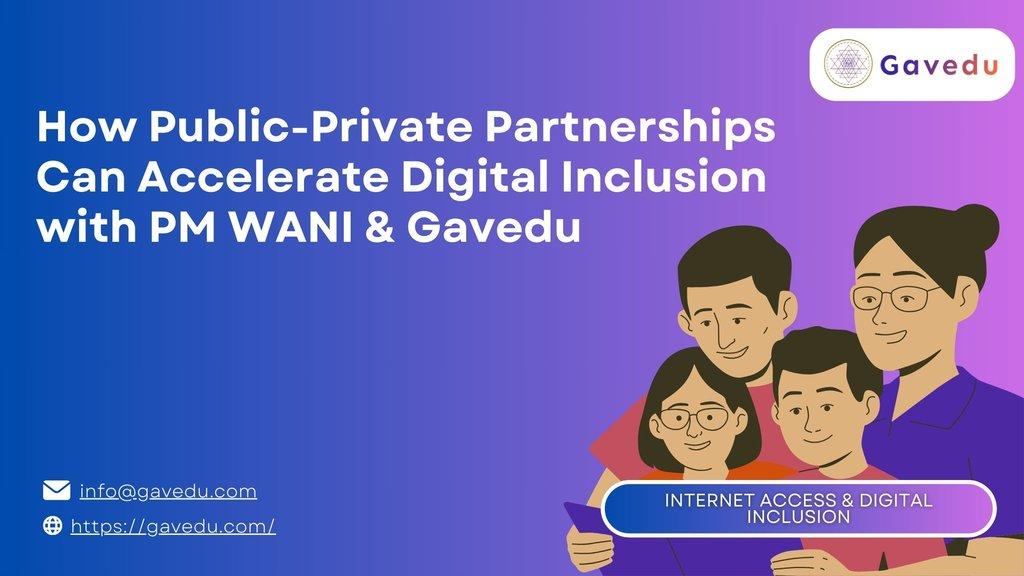How Public-Private Partnerships Can Accelerate Digital Inclusion with PM WANI & Gavedu
Bridging the digital divide requires a cooperative approach where governments, private enterprises, and technology leaders collaborate to make internet access affordable and widespread. Public-Private
The Need for Collaboration Between Governments, Businesses, and Tech Innovators
Bridging the digital divide requires a cooperative approach where governments, private enterprises, and technology leaders collaborate to make internet access affordable and widespread. Public-Private Partnerships (PPPs) play a crucial role in expanding connectivity, ensuring that rural and underserved communities gain access to the digital economy.
Key Benefits of PPPs in Digital Inclusion:
- Shared Infrastructure Investment: Governments provide policy support, while private enterprises bring funding and technological expertise.
- Sustainable Business Models: Combining subsidized public internet programs with private-sector innovation ensures long-term sustainability.
- Scalable Solutions: PPPs enable the deployment of large-scale connectivity projects using PM WANI’s open network framework and Gavedu’s decentralized approach.
- Regulatory and Compliance Support: Governments can set favorable policies while businesses handle implementation and scalability.
Case Studies of Successful Partnerships in Expanding Internet Access
1. India’s PM WANI Initiative & Private Sector Collaborations
India’s PM WANI framework has successfully enabled village-level entrepreneurs (VLEs) and private ISPs to set up Public Data Offices (PDOs), providing affordable Wi-Fi access. Partnerships with telecom companies and local startups have helped expand this initiative to remote regions.
Impact:
- Over 1 million PDOs deployed across India.
- Internet access extended to thousands of villages, benefiting students, farmers, and small businesses.
2. Gavedu’s Blockchain-Powered Model for Community-Driven Connectivity
Gavedu leverages blockchain technology to create transparent, secure, and decentralized internet distribution. Through partnerships with local entrepreneurs, municipal bodies, and businesses, Gavedu has established sustainable ad-supported Wi-Fi networks in underserved areas.
Key Features:
- Revenue Sharing: Businesses sponsor internet access through advertisements, reducing costs for users.
- GVDT Token System: Users earn tokens by engaging with sponsored content, making internet access more inclusive.
- Local Empowerment: Entrepreneurs and community organizations manage networks, creating new income opportunities.
Success Story:
- A pilot project in rural Maharashtra connected thousands of users, enabling digital payments, online education, and telemedicine services.
3. Kenya’s Government & Private ISP Collaboration for Rural Broadband
Kenya has successfully implemented rural broadband programs through partnerships with global tech firms and local telecom providers. Government incentives and infrastructure investment have helped expand 4G and Wi-Fi networks to remote villages, significantly boosting education and e-commerce.
Impact:
- Increase in rural internet penetration by 50% in five years.
- Growth of digital financial services, benefiting over 20 million mobile banking users.
The Path Forward: Scaling Public-Private Partnerships for Universal Internet Access
For PPPs to be effective, the following steps are crucial:
- Policy Frameworks: Governments must implement clear regulations and incentives to encourage private-sector participation.
- Technology Innovation: Businesses should leverage decentralized models like Gavedu to ensure cost-effective, scalable solutions.
- Community Involvement: Local stakeholders must be empowered to own, manage, and sustain connectivity projects.
By fostering strong partnerships between governments, businesses, and technology innovators, we can accelerate digital inclusion and ensure that internet access becomes a universal right rather than a privilege.
Abhishek Sonawane
Abhishek Sonawane is the CEO of iAriana Technologies and the Chief Operating Officer of Gavedu. With over 15 years of experience in technology leadership, he specializes in Enterprise solutions, Blockchain, AI/ML, and decentralized connectivity. At iAriana Technologies, he drives innovation in fleet tracking and enterprise security, while at Gavedu, he is revolutionizing internet access through blockchain-powered solutions. Passionate about leveraging technology for business growth and social impact, he shares insights on the latest tech trends, industry advancements, and digital transformation.







No comments yet. Login to start a new discussion Start a new discussion